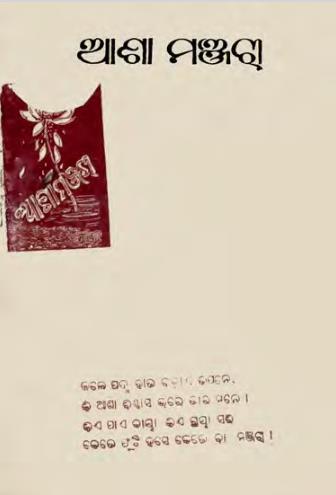In the rich tapestry of Odia literature, few works resonate with the depth and beauty of emotion as profoundly as Ashamanjari, a remarkable collection of poetry by Padma Charana Patnaik, published in 1946. Translated as The Untamed Blossom, this work captures the essence of human experiences—love, longing, nature, and spirituality—inviting readers to embark on a lyrical journey through the delicate intricacies of life.
At the heart of Ashamanjari is Patnaik’s ability to express complex emotions with simplicity and grace. His poetry is imbued with a sense of authenticity, reflecting the joys and sorrows inherent in the human condition. Through his verses, Patnaik explores the many facets of love, from the euphoric heights of passion to the melancholic depths of loss. This exploration of love transcends mere romantic notions, delving into the emotional landscapes of familial bonds, friendship, and the universal yearning for connection.
One of the standout features of Ashamanjari is its rich vivid imagery. Patnaik draws upon the beauty of the natural world, weaving it seamlessly into his expressions of feelings and thoughts. He often uses floral and natural motifs to symbolize emotions, reflecting the interconnectedness of humanity and nature. The title itself, Ashamanjari, invokes the image of a flower that remains untamed and wild, representing the raw and unfiltered aspects of emotion that the poet seeks to capture. This organic imagery serves not only to beautify the text but also to deepen the reader’s emotional engagement with the poems.
Patnaik’s mastery of language shines through in the rhythmic quality of his verses. The musicality of his poetry invites readers to savor each line, experiencing the ebb and flow of emotions as they navigate through the rich landscape of his thoughts. His use of meter, rhyme, and cadence creates a lyrical harmony that enhances the overall impact of the work, making it a pleasure to read and recite.
Another significant aspect of Ashamanjari is its philosophical undertones. Beyond the exploration of personal emotions and relationships, Patnaik engages with broader existential themes. He reflects on the transience of life, the inevitability of change, and the beauty found within fleeting moments. This contemplation of life’s impermanence encourages readers to embrace the present, fostering a sense of gratitude for the beauty that surrounds us even in the face of adversity.
Moreover, Ashamanjari is a cultural artifact that encapsulates the essence of post-colonial Odisha. Published shortly after India gained independence, the poetry reflects the spirit of a society in transition, embracing its identity while grappling with new realities. Patnaik’s work evokes a sense of pride in Odia culture, promoting the significance of local language and tradition during a time of reawakening.
Books Info
| Books name | Ashamanjari / ଆଶା ମଞ୍ଜରୀ |
| Author | Padma Charana Patnaik |
| No Of pages | 95 |
| Publisher | Students Store |
| Publication | 1946 |
| Printed At | NA |
| Distributor | NA |

